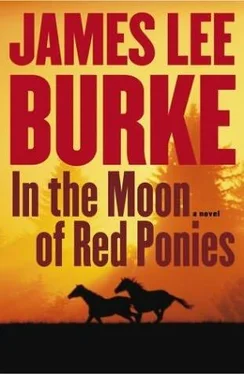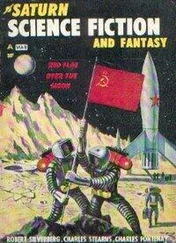James Burke - In the Moon of Red Ponies
Здесь есть возможность читать онлайн «James Burke - In the Moon of Red Ponies» весь текст электронной книги совершенно бесплатно (целиком полную версию без сокращений). В некоторых случаях можно слушать аудио, скачать через торрент в формате fb2 и присутствует краткое содержание. Жанр: Полицейский детектив, на английском языке. Описание произведения, (предисловие) а так же отзывы посетителей доступны на портале библиотеки ЛибКат.
- Название:In the Moon of Red Ponies
- Автор:
- Жанр:
- Год:неизвестен
- ISBN:нет данных
- Рейтинг книги:5 / 5. Голосов: 1
-
Избранное:Добавить в избранное
- Отзывы:
-
Ваша оценка:
- 100
- 1
- 2
- 3
- 4
- 5
In the Moon of Red Ponies: краткое содержание, описание и аннотация
Предлагаем к чтению аннотацию, описание, краткое содержание или предисловие (зависит от того, что написал сам автор книги «In the Moon of Red Ponies»). Если вы не нашли необходимую информацию о книге — напишите в комментариях, мы постараемся отыскать её.
In the Moon of Red Ponies — читать онлайн бесплатно полную книгу (весь текст) целиком
Ниже представлен текст книги, разбитый по страницам. Система сохранения места последней прочитанной страницы, позволяет с удобством читать онлайн бесплатно книгу «In the Moon of Red Ponies», без необходимости каждый раз заново искать на чём Вы остановились. Поставьте закладку, и сможете в любой момент перейти на страницу, на которой закончили чтение.
Интервал:
Закладка:
I walked across the street to Fay Harback’s office. I told her of my conversation with the sheriff. I also told her of Wyatt Dixon’s early morning visit to my house.
“What’s Dixon up to?” she said.
“I don’t have any idea.”
“We think we may have found the car that was used to abduct Lester Antelope. Or at least it fits the description given by the homeless man who saw the doll thrown from the window. It was burned in a canyon up Fish Creek. The tags were gone, but the vehicle ID matches up with a car that was stolen in Superior a couple of weeks ago. The sheriff didn’t tell you any of this?”
“He didn’t get around to it.”
“So you think the guys who murdered Antelope might come after you or Johnny American Horse now? Because you or Johnny might have access to the material that was stolen out of the Global Research lab?”
“They think I may have access.”
“No truth to that?”
“No.”
“Johnny doesn’t know anything about it, either?”
“He wasn’t involved.” I tried to hold my eyes on hers.
“I feel sorry for you,” she said.
“Why?” My face started to tingle, as though someone had popped me contemptuously on the cheek.
“You’re going to take his bounce,” she replied.
At lunchtime Lucas came into the office, his jeans hitched up above his hips, the legs tucked into his boots. “You eat yet?” he said.
“Can’t do it. Got to work.”
He looked disappointed for a moment, then he smiled. “I got invited to play at the bluegrass festival in Hamilton,” he said.
“That’s good, bud.”
“Y’all coming?”
“Couldn’t run us off with a shotgun.”
He stared idly out the window at the trees on the courthouse lawn. “Weird thing happened this morning. Somebody stuck a crunched-up license plate in my mail slot,” he said.
“What kind of plate?” I said.
“Washington State. It was twisted into a cone and jammed into the slot. Why would somebody do that?”
“Where is it?”
“In my trash can. What’s going on?”
“Let’s go,” I said.
We drove over to his apartment and I removed the tag from his garbage can with a pencil and dropped it in a plastic shopping bag. I called Fay Harback on my cell phone and read the tag numbers to her. I heard her shuffling papers around on her desk.
“Bring it in. We’ll see if there’re any latents on it. It came off the burned vehicle we found up Fish Creek…Hello?” she said.
“Where’s Wyatt Dixon live?” I said.
Chapter 9
Wyatt lived up on the Blackfoot River, on a grassy bench north of a sawmill and an unused railroad trestle. Several years back an ice jam had crashed through the cottonwoods, sweeping away the owner’s truck, automobile, and machine shop, depositing great chunks of frozen flotsam inside the downstairs area of the main house. Wyatt rented the house for a song. He strung canvas over the holes in the first story and moved into an upstairs bedroom that allowed him a view of the only two ways the property could be accessed-either by a steel swing bridge suspended over the river or by a single-track log road that wound over the hill behind the house.
The sky was still filled with light when I parked on the riverbank and headed toward the swing bridge. The wind blowing down the canyon smelled of damp stone, pine needles, and wood smoke, and a fisherman was down below in the current, flipping a dry fly out on the riffle, taking up the slack in his line with his left hand. The swing bridge pinged and bounced with my weight as I crossed it, then the sun dropped behind the mountain, filling the gorge with shadow, and I swore I saw a figure in the willows at the far end of the bridge.
Ain’t nobody home, Billy Bob. Better be glad, too, L. Q. Navarro said.
Mind your own business, I replied.
You’re trying to use Dixon as a cure for your problem. That’s like shopping in hell for an air-conditioning unit.
What do you suggest?
Inside his black coat he wore a white shirt with pale gray stripes in it. A red ribbon folded in the shape of a shepherd’s hook was pinned to the place where I had shot and killed him. The problem is you haven’t figured out what he’s really up to. This boy ain’t your reg’lar psychopath, he said.
I sure could use you now, L.Q. I hate myself for what I did down there on the border.
But he was gone. I turned around and walked back across the bridge, my boots clanking on the steel grid. The fisherman down below, who had witnessed my conversation with someone no one else saw, was looking at me strangely. I waved at him, but he didn’t respond.
I sat in my truck, trying to think. As L.Q. had indicated, I had never figured out Dixon. He was born twenty miles from the birthplace of Audie Murphy, on a dust-blown, locust-infested farm where his parents apparently raised children as they would livestock. Then the family moved to another rental farm, in an even more godforsaken place, not far from the birthplace of Clyde Barrow. Somehow it seemed more than coincidence that Wyatt’s early life was geographically linked to names that were so antithetically juxtaposed in connotation.
At age fifteen, Wyatt ran away from home and enlisted in the United States Army. At bayonet practice a drill instructor who had a particular dislike for Wyatt made the mistake of choosing him for a demonstration with a pugil stick. Wyatt broke the drill instructor’s jaw with the pugil stick. The Army found the drill instructor at fault but later realized it had underestimated Wyatt’s potential when he waylaid a black mess sergeant in a San Antonio alley, cut off his stripes, and stuffed them down his throat.
He picked chickens in a Texas slaughterhouse, hauled illegal Mexican beef, and did time in a Coahuila prison, where the guards made him kneel on stones with his wrists chained to a log stretched across his shoulders. He wandered the American West in stolen cars and pickups, sleeping under the stars, working cockfight pits, breaking mustangs in Nevada, gypo logging in the Cascades, running a bale or two of weed up from Baja when he ran short of cash. His body looked as though it were made from whipcord. The muscles in his forearms swelled into balloons; his grip was like steel cable. Then at age nineteen Wyatt discovered the world of a full-time, honest-to-God rodeo man.
As a bull rider, he would tie himself down with a suicide wrap and either ride to the buzzer or take his chances on being dragged, stomped, hooked, or flung into the boards. As a steer wrestler, he would fly from the saddle, grab the steer’s horns, and slam it to the ground with such force he and the steer would seem to disappear inside a brown aura of dust and desiccated manure. From Big D to Calgary, the crowds loved Wyatt Dixon.
Barroom women sucked his fingers, and mainline ex-cons, neo-Nazis, and outlaw bikers walked around him. His skin was stitched with scar tissue but clean of tattoos, the skeletal structure of his face like a Roman soldier’s. He spent large sums on fine boots and embroidered western shirts, drank tequila with a beer back, and belonged to Aryan supremacist groups out of convenience rather than need. He ate his pain, let his enemies break their fists on his face, and grinned like a jack-o’-lantern at the condemnation of the world.
It was Dixon’s courage that made no sense. Sociopaths are invariably cowards, and their cruelty exists in direct proportion to their own fear and self-pity. If they show any calm when they’re executed by the state, it’s because they’ve forced their executioner to do what they could not do themselves.
Wyatt Dixon didn’t fit the category.
As I started the truck, I remembered the two rodeo passes he had tried to give me and Temple at the cafe in Missoula, tickets I had brushed off the table onto the floor. Then I remembered seeing an ad in the morning paper. The rodeo, in Stevensville, began that weekend.
Читать дальшеИнтервал:
Закладка:
Похожие книги на «In the Moon of Red Ponies»
Представляем Вашему вниманию похожие книги на «In the Moon of Red Ponies» списком для выбора. Мы отобрали схожую по названию и смыслу литературу в надежде предоставить читателям больше вариантов отыскать новые, интересные, ещё непрочитанные произведения.
Обсуждение, отзывы о книге «In the Moon of Red Ponies» и просто собственные мнения читателей. Оставьте ваши комментарии, напишите, что Вы думаете о произведении, его смысле или главных героях. Укажите что конкретно понравилось, а что нет, и почему Вы так считаете.












